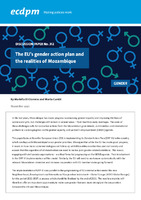The EU’s gender action plan and the realities of Mozambique

com document
Author
European Centre for Development Policy Management
Di Ciommo, Mariella
Cumbi, Marta
Date
2021-11Subject headings
Gender Action Plan ; Legislative ; Civil society organisationsAbstract
Mozambique is advancing gender equality and women empowerment (GEWE) based on its commitments at
international and regional levels, domesticated through national laws and policies and materialised by national plans
and programmes. In 2007, the country developed a gender policy and an accompanying implementation strategy
(República de Moçambique 2018a). Updated in 2018, it provides context-specific guiding principles with the view to
enable decision-making and the identification of actions to elevate the status of women and improve gender
equality.1 Several ministries also developed their own gender strategies that seek to incorporate the gender
dimension in their programmes and structures. The Government’s Five-Year Programme (PQG) for 2020-2024 guides
policies in all areas of the national public administration and includes a gender dimension under the Human
Development and Social Justice Strategic objectives, although not in other policy domains (República de
Moçambique 2020). 2
Despite some progress on the GEWE agenda, there is still a lot of work to do in Mozambique to align the country
legislative and policy plans to the reality of its populations. Some progress has been made in some social indicators
over the last few years. For example, the average enrolment rate for girls in primary education improved from 47.9%
in 2015 to 48.2% in 2019. The increase is small but considering that the enrolment rate for boys decreased from 52%
to 51.8% in the same period, it is an achievement (INE 2019). The maternal mortality rate has also dropped, although
quite modestly. In 2017, the maternal mortality rate was 451.6/100,000 compared to 500.2/100,000 in 2007 (INE
2017a). However, several challenges remain. Mozambique is ranked the 10th country in the world with high
prevalence of early marriages: 48% of women were married before the age of 18 and 14% were married before 15,
in 2011 (Plan International 2019). In 2017, on average, 39% of people of 15 years of age or above were illiterate, but
women (49.4%) much more than men (27.2%) (INE 2017b). In 2018, women between 15 and 49 years old were more
likely than men to have HIV, with a prevalence rate of 15.1% for the former and 10.2% for the latter (MISAU and INE
2019).
As an external plan to promote GEWE worldwide, the EU’s Gender Action Plan III – An Ambition Agenda for Gender
Equality and Women’s Empowerment in EU External Action (GAP III), released in December 2020, provides an
opportunity for enhanced collaboration between the EU, the Mozambican state and its civil society (EC 2020). The
parallel programming of EU external action, a complex exercise that defines the EU priorities and financial allocations
in different contexts, offers the chance to better integrate gender objectives into the EU action for the period 2021-
2027 (Di Ciommo 2021).
